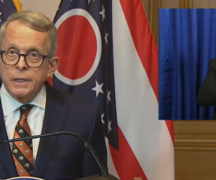By Susan Tebben
A bill seeking to address financial barriers and access to higher education, along with speech on campuses, is now headed for House review after the Ohio Senate passed it nearly unanimously.
In a 31-2 vote, Senate Bill 135 cleared one chamber of the Ohio legislature, pressing forward new rules for student debt transparency and a pilot program for those who dropped out of school, but want a second chance.
The proposed legislation also requires not only higher education institutions, but K-12 facilities as well to adopt a policy on speech on campus and and establish a process to appeal allegations of free speech violations.
“This bill is about protecting the free speech of all students and faculty to ensure that our campuses and school districts are not only beacons of free speech and individual expression, but that the focus is on critical thinking skills, to ensure that students can thoughtfully develop their own opinions and make their own decisions,” bill sponsor state Sen. Jerry Cirino, R-Kirtland, said.
The measure hits the Senate floor one day after two bills were introduced in the House to control teaching in all tax-funded educational forums that would promote certain “ideologies” over others. One bill targeted K-12 education specifically, the other was more broad.
Cirino said SB 135 would provide $3 million over the next two years for scholarships that would allow 1,500 students who left higher education in the past five years to try again.
Under the measure, an initiative would also be put in place to allow community college students to transfer credits to state universities and requires partnerships between state universities and community colleges and technical colleges for dual enrollment and programming.
For those just beginning the process of secondary education, the bill targets high school guidance counselors in an effort to make sure students receive all their post-graduation options, including trade schools, community schools and four-year colleges.
That advice should also include the actual cost of a chosen education path, Cirino said of the bill.
“The solution to student debt is not wholesale forgiveness, because that does not solve future problems,” Cirino said. “The solution to student debt is to make sure that students know early on in their career what their lower cost options are, for us to help make them available, and to make sure that they are better counseled on these options.”
In the Senate floor vote, the bill received bipartisan support, with the only criticism stemming from the clauses on freedom of speech. Sen. Nickie Antonio, D-Lakewood, said she was encouraged by the rest of the language in the bill, but heard concerns on whether the free speech language “actually encourages or quashes that.”
“We want people to have the freedom to express their ideas and do that in an environment that’s safe and open,” Antonio said before voting against the bill. “It’s what our democracy was founded on.”
Antonio said she hopes the bill will evolve under House consideration.
The bill had the support of several community colleges and higher education advocates in previous committee hearings, despite the free speech language.
***
Also from Ohio Capital Journal:
Sports betting in Ohio takes one more step toward legalization
This time next year, Ohioans could be placing sports bets on Cincinnati Reds games or choosing an underdog to win it all at the Memorial golf tournament in Dublin.
That’s if the Ohio House of Representatives quickly follows the lead of the state senate, whose members approved the framework for legalized sports betting earlier this week.
The near-unanimous vote put sports gambling in the Buckeye State one step closer to reality — at least, gambling in a localized and regulated way.
The Ohio Senate plan calls for three separate sportsbook licenses that would give Ohioans a chance to place bets online, at professional sports arenas and at a select few bars and restaurants. READ MORE
Senate budget blocks cities from taxing plastic bags
The Ohio Senate slid into its state budget proposal a provision to make permanent a temporary ban that blocks cities from taxing the use of plastic grocery bags.
Ohio Republicans since at least 2018 have tried to short-circuit cities from restricting the use of disposable, plastic grocery bags.
Last year, Gov. Mike DeWine signed into law House Bill 242, a temporary, one-year ban on cities from taxing what the law defines as “auxiliary containers:” bags, cans, cups, containers, kegs, bottles or other single-use packaging designed to consume or transport food.
The Senate budget would make permanent this ban, which is set to expire in January 2022. READ MORE





